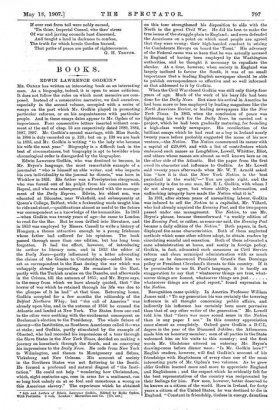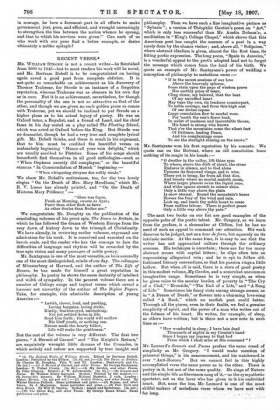BOOKS.
• EDWIN LAWRENCE GODK1N.*
MR. OGDEN has written an interesting book on an interesting man. As a biography, indeed, it is open to some criticism. It does not follow the rules on which most memoirs are composed. Instead of a consecutive narrative, we find ourselves, especially in the second volume, occupied with a series of essays on the part which Mr. Godkin played in promoting particular reforms, or on his acquaintances with particular people. And in these essays dates appear to Mr. Ogden of no importance. Four consecutive letters inserted without comment at the end of chap. 13 are respectively dated 1889, 1884, 1887, 1897. Mr. Godkin's second marriage, with Miss Sands, in 1884 is duly recorded on p. 128; but on p. 139 we are back in 1883, and Mr. Godkin is writing "to the lady who became his wife the next year." Biography is a difficult task in the best of circumstances, but biography is apt to bewilder when chronological order is disregarded by the biographer.
Edwin Lawrence Godkin, who was destined to become, in Ma. Bryce's language, the most remarkable example of a journalist "who is himself an able writer, and who imparts his own individuality to the journal he directs," was born in Wicklow in .1831. His father was a Presbyterian clergyman, who was forced out of his pulpit from his connexion with Repeal, and who was subsequently entrusted with the management of the Daily Express. Edwin, his eldest son, was educated at Silcoates, near Wakefield, and subsequently at Queen's College, Belfast, while a foxhunting uncle taught him to ride and shoot—qualifications almost as useful to the future war correspondent as a knowledge of the humanities. In 1851 —when Godkin was twenty years of age—he came to London to read for the Bar. But he soon drifted into literature, and in 1853 was employed by Messrs. Cassell to write a history of Hungary, a theme attractive enough to a young Irishman whose father had suffered for his opinions. The book passed through more than one edition, but has long been forgotten. It had the effect, however, of introducing its author to literary men, and in 1853 the editor of the Daily News—partly influenced by a letter advocating the claims of the Greeks to Constantinople—asked him to act as correspondent in the East during the war which was unhappily already impending. He remained in the• East, partly with the Turkish armies on the Danube, and afterwards in the Crimea, till the autumn of 1855 ; and Mr. Bryce says, in the essay from which we have already quoted, that "the horror of war which he retained through his life was due to the glimpse of it he had" at that time. Returning home, Godkin accepted for a few months the editorship of the Belfast Northern Whig ; but "the call of America" was already upon him, and in the autumn of 1856 he crossed the Atlantic and landed at New York. The States from one end to the other were seething with the excitement consequent on .Buchanan's election to the Presidency. The whole future of slavery—the Institution, as Southern Americans called it—was at stake; and Godkin, partly stimulated by the example of Olmsted, who had recorded his impressions of a tour through the Slave States in the New York Times, decided on making a journey on horseback through the South, and on conveying his impressions to the Daily News. He rode from New York to Wilmington, and thence to Montgomery and Selma, Vicksburg and New Orleans. His account of society in the Southern States was not flattering to the South. He formed a profound and natural disgust of "the Institution." He could not help "wondering how Christendom, which, eight centuries ago, rose in arms for a sentiment, can so long look calmly on at so foul and monstrous a wrong as this American slavery." The experience which he obtained
•
on this tour strengthened his disposition to side with the North in the great Civil War. He did his best to make the true issues of the struggle plain to England; and even defended the Americans on a point on which most people are agreed that they were wrong : their high-handed conduct in seizing the Confederate Envoys on board the 'Trent.' His advocacy of the Federal cause was so keen that he was actually accused in England of having been employed by the Washington authorities, and he thought it necessary to repudiate the slander. At a time, however, when society in England EMS largely inclined to favour the South, it was of no small importance that a leading English newspaper should be able to publish correspondence so effective and so well informed as that addressed to it by Godkin.
When the Civil War closed Godkin was still only thirty-four years of age. Much of the work of his busy life had been done for the Daily News. But since his arrival in America he had been more or less employed by leading magazines like the North American Review, or leading newspapers like the New York Times. In 1865, when the conclusion of peace was lightening his work for the Daily News, he carried out a project, which he had been gradually maturing, for founding a high-class weekly newspaper. His recollection of the brilliant essays which be had read as a boy in Ireland nearly twenty years before probably suggested the name of his new venture,—the Nation. The Nation commenced its career with a capital of £20,000, and with a list of contributors which embraced such names as Longfellow, Lowell, Whittier, Eliot, and others whose names are almost as well known here as on the other side of the Atlantic. But the paper from the first owed its character and influence to Godkin. As Mr. Lowell said twenty years afterwards when Mr. W. T. Arnold asked him "how it is that the New York Nation is the best periodical in the world,"—" You are quite right, and the superiority is due to one man, Mr. E. L. Godkin, with whom I do not always agree, but whose ability, information, and unflinching integrity have made the Nation what it is."
In 1881, after sixteen years of unremitting labour, Godkin was induced to sell the Nation to a capitalist, Mr. Villard, who had already acquired the Evening Post, and the two papers passed under one management. The Nation, to use Mr. Bryce's phrase, became thenceforward "a weekly edition of the Evening Post, or rather, as some one said, the Evening Post became a daily edition of the Nation." Both papers, in fact, displayed the same characteristics. Both of them neglected methods which some other editors adopt, to obtain readers by circulating scandal and sensation. Both of them advocated a sane administration at home, and sanity in foreign policy. Godkin, in fact, advocated such measures as Civil Service reform and clean municipal administration with as much energy as be denounced President Grant's San Domingo policy or President Cleveland's threats to this country. If it be permissible to use St. Paul's language, it is hardly an exaggeration to say that "whatsoever things are true, what soever things are honest, whatsoever things are just whatsoever things are of good report," found expression in the Nation.
Recognition came quickly. In America Professor William James said "To my generation his was certainly the towering influence in all thought concerning public affairs, and indirectly his influence has certainly been more pervasive than that of any other writer of the generation." Mr. Lowell told him that "there was more sound sense in the Nation than in any paper I see." In this country appreciation came almost as completely. Oxford gave Godkin a D.C.L. degree in the year of the Diamond Jubilee ; the Atheneeum made him an honorary member; men of all parties in the State welcomed him on his visits to this country ; and the first words Mr. Gladstone uttered on entering Mr. Bryce's drawing-room before dinner were "Is Mr. Godkin here ?" English readers, however, will find Godkin's account of his friendships with Englishmen of every class one of the most interesting parts of Mr. Ogden's two volumes. As he grew older Godkin learned more and more to appreciate England and Englishmen ; and the respect which be evidently felt for the best representatives of the country was reciprocated by their feelings for him. Few men, however, better deserved to be known as a citizen of the world. Born in Ireland, for forty years a citizen of the 'United States, he was destined to die in England. "Constant in friendship, tireless in energy, dauntless in courage, he bore a foremost part in all efforts to make government just, pure, and efficient, and wrought unceasingly to strengthen the ties between the nation whence he sprang, and that to which his services were given." Can such of us who work with our pens find a better example, or desire ultimately a nobler epitaph P







































 Previous page
Previous page